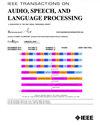噪声鲁棒子空间高斯混合模型的联合不确定性解码
IEEE Transactions on Audio Speech and Language Processing
Pub Date : 2013-09-01
DOI:10.1109/TASL.2013.2248718
引用次数: 15
摘要
联合不确定性解码(JUD)是一种基于模型的噪声补偿技术,适用于基于高斯混合模型的语音识别系统。与矢量泰勒级数(VTS)补偿不同,在声学模型中对单个高斯分量进行补偿,JUD将高斯分量聚类成较小数量的类,共享给定类中高斯分量集的补偿参数。这大大降低了计算成本。本文研究了基于子空间高斯混合模型(SGMM)的语音识别系统的噪声补偿。SGMM中的高斯分量的总数通常非常大。因此,由VTS执行的单个高斯分量的直接补偿在计算上是昂贵的。在本文中,我们证明了基于juda的噪声补偿可以以一种计算效率高的方式成功地应用于SGMMs。我们在标准Aurora 4语料库上评估了JUD/SGMM技术。我们的实验结果表明,与基于vts或基于judd的噪声补偿的传统GMM系统相比,JUD/SGMM系统的单词错误率更低。本文章由计算机程序翻译,如有差异,请以英文原文为准。
Joint Uncertainty Decoding for Noise Robust Subspace Gaussian Mixture Models
Joint uncertainty decoding (JUD) is a model-based noise compensation technique for conventional Gaussian Mixture Model (GMM) based speech recognition systems. Unlike vector Taylor series (VTS) compensation which operates on the individual Gaussian components in an acoustic model, JUD clusters the Gaussian components into a smaller number of classes, sharing the compensation parameters for the set of Gaussians in a given class. This significantly reduces the computational cost. In this paper, we investigate noise compensation for subspace Gaussian mixture model (SGMM) based speech recognition systems using JUD. The total number of Gaussian components in an SGMM is typically very large. Therefore direct compensation of the individual Gaussian components, as performed by VTS, is computationally expensive. In this paper we show that JUD-based noise compensation can be successfully applied to SGMMs in a computationally efficient way. We evaluate the JUD/SGMM technique on the standard Aurora 4 corpus. Our experimental results indicate that the JUD/SGMM system results in lower word error rates compared with a conventional GMM system with either VTS-based or JUD-based noise compensation.
求助全文
通过发布文献求助,成功后即可免费获取论文全文。
去求助
来源期刊
自引率
0.00%
发文量
0
审稿时长
24.0 months
期刊介绍:
The IEEE Transactions on Audio, Speech and Language Processing covers the sciences, technologies and applications relating to the analysis, coding, enhancement, recognition and synthesis of audio, music, speech and language. In particular, audio processing also covers auditory modeling, acoustic modeling and source separation. Speech processing also covers speech production and perception, adaptation, lexical modeling and speaker recognition. Language processing also covers spoken language understanding, translation, summarization, mining, general language modeling, as well as spoken dialog systems.

 求助内容:
求助内容: 应助结果提醒方式:
应助结果提醒方式:


